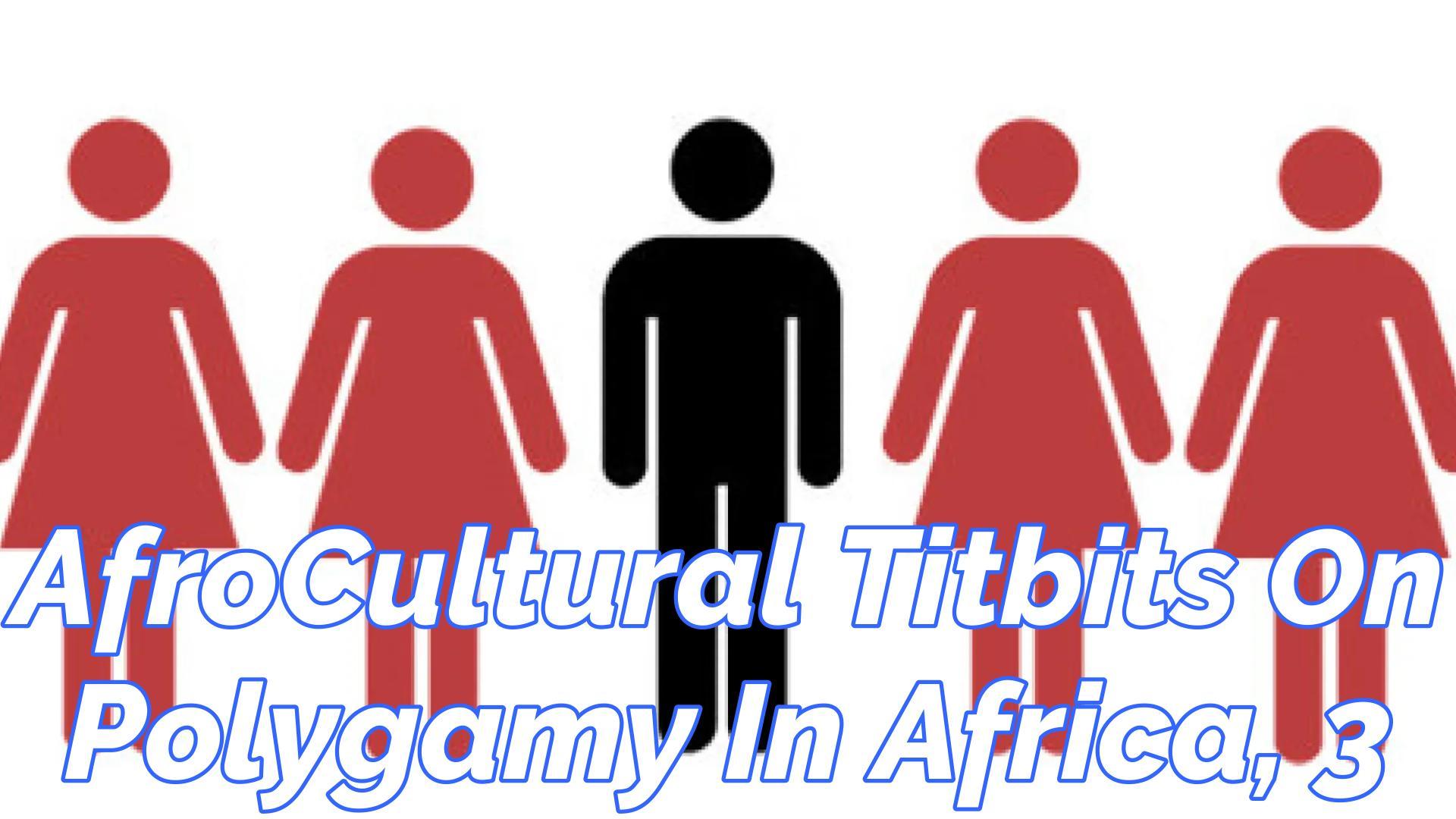August 8, 2022
THE FUTURE OF POLYGAMY
Greetings!
We are on edition 3 of our series on “AfroCultural TitBits” on “Polygamy In Africa.” Our traditionalist, “Udoakpuenyi,” talks about the future of polygamy in Africa today. I am Harry Agina.
In our two previous editions, Udoakpuenyi, introduced us to polygamy, starting with a global overview. The intro aimed to dispel the common Western fallacy on polygamy, which portrays polygamy as an African ‘thing.’ Importantly also, Udoakpuenyi pointed at the fact that man is commonly polygamous by nature; when it is not as husband and wives, it happens in form of polygamous arrangement. Of course, there are also some one-man-one-woman kind of guys in Africa and elsewhere, too. I don’t’ wanno support the womenfolk out there who insist that every single man in the world is a sex animal, meeeeeeeeeen!!!
Anyway, Udoakpuenyi also took polygamy all the way back to the biblical days of Abram, and many more like Abram in that ancient era. King Solomon took the prize both in “polygamous HOMES” and “polygamous ARRENGEMENTS,” with 300 wives and 700 concubines. So, it is concluded that it is definitely not an African thing, after all. And then, we talked bout, “Why Africans embraced polygamy in the good old days.” If you missed those editions, not to worry. I do have the links to them for you at the end of this.
In today’s edition, Udoakpuenyi talks about the future of polygamy in Africa. Is it dying off, or is it getting stronger in contemporary Africa? Here we go with his answer:
AfroCultural TitBits on Polygamy In Africa: Edition 3
The Future of Polygamy
Is polygamy going away any time soon, or is it still here with us for a long time? Some observers believe that western education and poverty have done some deadly blows to polygamy. And this is true because, apart from maturity of the mind, and conduct, the basic requirement for polygamy is wealth. Any husband who desires to take a new wife must have the resources to set up a new apartment for the new family. Even in the days of rooming houses, the man must be able to build a separate hut and kitchen for the new wife. The idea was, and still is, to keep the wives reasonably separated, because human intolerance rises when people are crowded together. So, the more wealth you commanded, the more space you were able to create, and the better the family. Many people cannot afford that luxury these days; so, polygamy is affected in a downward trend.
This is true whether it is culture-based or religion-based polygamy. Islam allows a maximum of four wives to a man, and the main requirement is wealth. The polygamist must be able to take care of all the wives, and equally, too, without discrimination. You are not allowed to treat one better than others. Whatever that you provide for one, you must provide for the others.
We have seen in recent times, especially among Christian communities, people who have taken more than one wife. Just recently, a Nollywood actor in Nigeria, Yul Edochie trended on social media for taking a second wife. He received a lot of knocks, as well as praises, for that action. Yul is in his 40s. A popular Nigerian Lawmaker, a politician and a legal luminary, Ned Nwoke has 6 wives, four of whom are known to the public. Ned is in his 60s.
And in Nigeria also, a 74-year-old Simon Odo who is popularly known as “King of Satan,” had 59 wives with 300 children. He died in December 2021. There are a lot of polygamous men that exist in this modern society around Africa. And there are potential polygamists who a bad economy is restricting. As the Pew study that I have referred to in this series says, the number of practitioners may be relatively insignificant, but they are still very much around.
My personal experience with Polygamy:Those of us who saw the 1960s, 1970s, or even 1980s, could be familiar with polygamy in our families. The culture was beginning to fade away then, but it was still very much around, because some of us were products of the system. I happen to be one of them. In my family, my father was modest, with just two wives that shared a common compound with a single connecting door between the wives. It was a rooming house with two toilets and two kitchens, one belonging to each of the wives.
I was not fortunate enough to see my father as a grown child, but I could imagine that one could easily hear the other screaming in sexual orgy at night from one’s room. My mother was the younger of the wives, so I grew up knowing my father’s first wife as Mama Nnukwu (our big mama). Everybody called her that, and she was respected as such. You couldn’t tell the difference between the children of one mother and the other. Mama Nnukwu would sometimes cook for everybody and ensured that everybody had something to eat, no matter how small. And so did my mother. They had their businesses, which they did as petty traders, and provided for themselves.
Mama Nnukwu’s relations, as well as my mother’s relations, would mix up in the compound, and you could hardly tell the difference. It was one big happy family where everyone took care of each other. I did not know the difference between Mama Nnukwu’s siblings who lived with us, and my own biological mother’s siblings. It was one big happy family. So my understanding of polygamy is a family, though bigger, where love, harmony and respect lived.
Everybody has his or her different definitions of polygamy, depending on our experiences. I began to observe only recently, the level of resentment and rejection of that traditional institution that made a lot of us. Over time, the understanding of that traditional institution began to change. Rather than see it as our way of life as Africans, people see it as the cause of their lack of love and harmony.
Where The Misconception Started:I started wondering, where are all these coming from? Is it on polygamy as a matrimonial institution, or on human beings of a different generation who refused to tolerate and understand each other? One of what I noticed about humans is the tendency to blame someone else for things that go wrong in their lives.
I work in an office in Nigeria, which is an open hall of over 100 staff, each manning his or her system. Apart from politics, one thing that generates a common discussion is the issue of polygamy. If you want to see or hear the aggression in our female staff, just say a single word for polygamy. You will never try it again after the reaction that that you would receive from the womenfolk. Obviously, many believe that polygamy degrades women. No need to emphasize the point that our office is female-centric, in the interest of equality in the workplace. I will leave you to imagine the level of power that women control in such a place. It was one of the agendas of the colonial masters in Nigeria.
It is argued that the West saw that the foundation of the strength of the African culture and traditional institutions stood on the male. To upturn it, the west needed to empower women economically, to take over decisions, in families and communities, as well as political spaces. So in my office, once the women raise their voices in condemnation of polygamy, all men calm down. You don’t hear any opposing voice. They see it as something strange to us, unacceptable and demonizing.
That got me thinking. On hindsight, I recollected that polygamy has always been part of our ways of life as Africans. In my background, it was so common that families were very large. And, the nuclear sections were identified by the mother’s name, not the father’s name.
MyTake:In the good old days, not too long ago, families that were small were looked at as weak. Big families had everything because they had more human resources. More children guaranteed the survival of the family, especially after a war. Also, health care was poor, so it made room for sudden deaths, which reduced family sizes. They thought that one woman was not enough to carry the burden of bearing enough children to take care of such eventualities.
Finally, while not making any special case for polygamy, it should be understood as a cultural or religious belief of the people. It should not be criticized by those who do not practice it. The choice should be left for the people who are interested, and it should not be moralized or condemned. If the parties agree to be in the union, so be it. The important thing is that the man has what it takes to care for the women and their children.
We should also understand that monogamy has its own challenges as we can see all over the world. Homes break every day. Poverty often amplifies any crack in relationship, be it polygamy or monogamy. People should learn to look for the problem of failed relationships within, rather than outside of themselves. If we care for the next person, eliminate greed, envy, and hate, and lower our expectations of others, many relationships will be successful.
By Udoakpuenyi…
Contributory editing by Harry Agina
So, we have talked about polygamy, with the women folk arguably being cheated. One thing that has not been adequately defended in the feminist arguments, is the fact that the women in polygamy are in it because they like it that way. Sure, there have been cases where it was forced on the women. But so has monogamous marriage sometimes, too.
Anyway, to even it all up, we did promise to talk about polyandry in Africa, too. This is where the women folk have the upper hand, with more than one husband. This is coming up on the next edition of “AfroCultural TitBits” on polygamy in Africa. Please check it out here, too.
Thanks a million.
Harry Agina
LINK TO AFROCULTURAL TITBITS ON POLYGAMY-CUM-POLYANDRY IN AFRICA





Pingback: “AFROCULTURAL TITBITS” ON POLYGAMY, EDITION 2 -
Your comment is awaiting moderation.
Unquestionably believe that which you stated. Your favorite reason appeared to be on the internet the easiest thing to be aware of. I say to you, I definitely get irked while people consider worries that they just do not know about. You managed to hit the nail upon the top and also defined out the whole thing without having side-effects , people can take a signal. Will probably be back to get more. Thanks